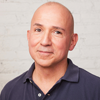
People sometimes think a community must be made up of members who are all the same, as if they were cookie cutter identical to each other. I think of communities as mosaics, made up of many faces, different experiences and an incredible assortment of lives.
This issue offers a collection of mosaics, starting with the photos taken on A Day with HIV, the magazine’s anti-stigma campaign that portrays 24 hours in the lives of people affected by HIV. On the first day of autumn every year since 2010, people everywhere photograph a moment of their day and share it on their social media with a caption that tells the time and location of their picture and what inspired them to take it, accompanied by the hashtag #adaywithhiv. This past year, dozens of photos were posted from across the U.S. and from 15 other countries around the world. Some of the pictures are featured on four different versions of the foldout cover and a special eight-page section inside.
These selfies are a mosaic of resilience. Together, they make the statement, There is life with HIV.
You’ll find families of all kinds spending time together, people attending concerts, having a normal day as they go grocery shopping and reflecting on how far they’ve come. A Day with HIV isn’t all smiles and sunshine, though, as Jeffery Parks in Fort Worth, Texas admits he’s having a rough day: “That’s the intent of this campaign, to capture an ordinary day in the life of people affected by HIV—both the negative and the positive.”
This issue also presents a mosaic of experiences. Writer Larry Buhl looks at a simple but effective educational presentation by Steven Cardenas, a nurse practitioner and instructor in Florida, that gives healthcare workers a better understanding of the stigma faced by transgender folk in medical care settings (Read here). This, in a state that has one of the most extreme bans on gender-affirming care in the country.
“The biggest challenge for trans patients is fear of rejection by providers,” Cardenas says. “This fear prevents trans people from seeking health care.”
In a powerful commentary, Katie Willingham speaks to that fear and writes about her experience as a transgender woman living with HIV in today’s political environment (Read here). She points to the growing number of proposed anti-trans laws being considered in state capitals across the country—467 so far this year, she reports according to the trans legislative tracker website translegislation.com, and counting.
“It seems that conservatives are determined to erase my community by any means available, including denying our right to health care,” Katie says. Still, she is determined. “We must remain vigilant in these times—unite across race, gender and sexual orientation; and fight against unjust legislation, discrimination and hate.”
HIV activists in Uganda and Ghana are also pushing back against government-backed hate while providing access to HIV care and preventive services in their home countries, writes Pascal Akahome in, “A sliver of hope.” Helen is a 28-year-old trans woman who founded one of the few trans-led and trans-focused HIV service organizations in Uganda before fleeing the country for safety. A law passed in May 2023, one of the harshest on the continent, that has criminalized being gay, mandates the death penalty for LGBTQ+ people and outlaws organizations that serve gay people.
A similar law is being reviewed by the supreme court in Ghana; the country’s president has said he will sign it if the court rules it is constitutional. Yet, Kizza, another woman Pascal spoke with, maintains a sliver of hope. “Some clinicians can be sympathetic to our cause; we can only hope that we find a way of building a connection with them so they can help our people,” she says.
Pascal transcends communities, if not worlds. Born in Nigeria and currently living in Canada, he is a pharmacist, researcher, a fellow of the Advocacy for Cure Academy of the International AIDS Society (IAS) and the director of the Antiretroviral Improved Access Initiative (AIAI), a local advocacy network based in Nigeria.
Our community transcends boundaries, labels and definitions that are imposed on us and ones we sometimes put on ourselves. Let these mosaics remind us of the variety of our community, and of the variety that exists within each of us.
You are not alone.


